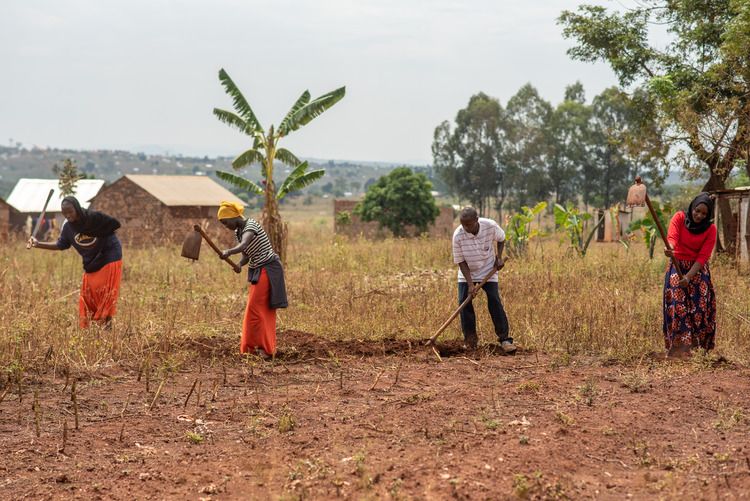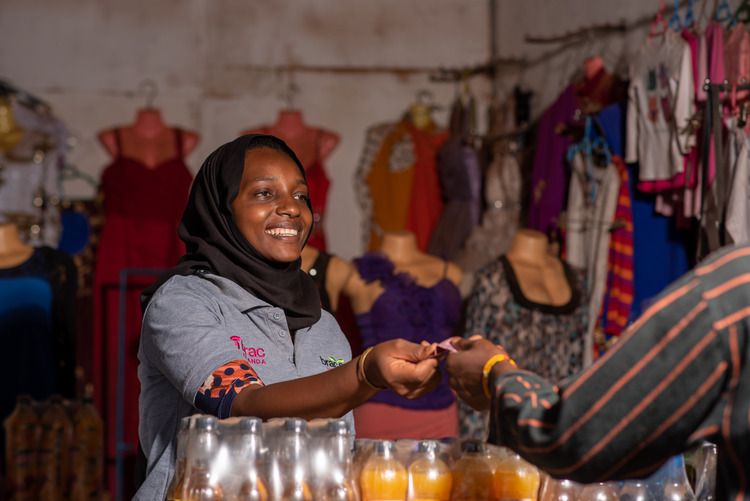 Stories
Stories
July 18, 2024 • 4 min read
Uganda hosts the highest number of refugees in Africa, and the third largest globally. The total refugee population stands at 1.2 million, a record high in history. The settlements face several challenges. Access to land for agriculture production remains a predominant challenge for youth especially young women and refugees, hindering large-scale agriculture production.
Markets for Youth
In partnership with the MasterCard Foundation, GOAL is implementing the Markets for Youth programme in Uganda. Over the course of five years, the programme will help 300,000 young Ugandans access dignified and fulfilling employment in the agricultural sector – including 70,000 women and 30,000 refugees. The program works through private sector actors, including financial institutions like banks, input and output market actors, ICT solution providers, business development service providers, and formal and informal training providers and government institutions, including District Local Government, to achieve the following outcomes:
- Increased access and utilisation of financial services and products.
- Increased access and utilisation of skills training information.
- Increased access and utilisation of inputs and output markets.
- Amplified youth voice and engagement.
Through this facilitative approach, the Markets for Youth Programme ensures sustainable systematic change. Learn more about the Markets for Youth programme.
Empowering Refugees
To tackle the land challenge, the Markets for Youth Program is promoting contract/block farming between refugees and host communities in Kiryandongo. Contract/block farming enables refugees to access land for production. Through this approach, refugees get a contract with a landlord in the refugee hosting community. In exchange of using a portion of the landlord’s land, the group shares net profits from the sale of outputs with the landlord.
To further facilitate the refugees, the program has collaborated with Wezesha Impact, a civil society organisation that focuses on youth upskilling; BRAC Seeds, a private company dealing in agricultural inputs and Equity Bank.
Razia is a 26-year-old woman who co-founded the Adolescents Youth Saving and Farming group in a refugee settlement in Kiryadongo, Western Uganda. Together, the group saves money, farms, and shares the proceeds from their maize, bean, cassava, and vegetable harvests.
“As youth, we were not interested in agriculture… But through the knowledge we received from partners, we embraced agriculture and saw it as an opportunity to become economically empowered,” Razia explained.

Razia and other group members working in their demonstration garden.
The Markets for Youth Program connected the group to Wezesha Impact, a civil society organisation that focuses on youth upskilling. Wezesha Impact connected the group to BRAC Seeds, a private company dealing in agricultural inputs, and Equity Bank, a commercial bank and money lender.
Wezesha Impact trained Razia and the group in entrepreneurial skills and safeguarding. Equity Bank provided financial literacy training and loans, while BRAC Seeds offered high-quality, drought-resistant seeds at affordable prices. BRAC also trained the young refugees on good agronomic practices, including post-harvest handling.
Previously, the limited availability of land prevented the refugees in Kiryadongo from engaging in large-scale agricultural production. Using their newly acquired business skills, the youth negotiated a contract with a local landlord. In exchange for using a portion of his land, the group now shares 10% of their profits to the landowner.
Youth Leadership
Razia’s success is a testament to the importance of youth leadership. Wezesha Impact and BRAC rewarded Razia’s progress by promoting her to the roles of Youth Champion and Community Agriculture Promoter, respectively. Now, Razia is empowering refugees by offering training on good agricultural practices. Under Razia’s stewardship, the group has grown from 25 members to 43.
Through block farming, Razia’s group planted 50 kg of maize on the ten acres of land, yielding 90 bags (120kg each) of maize. While 20 bags have already been sold at UGX 3,402,000 (est. $875), the group is saving the remaining 70 bags to sell later at a better price.
The group also plans to reinvest the money by acquiring more land. Some money will be saved and serve as an emergency fund for the group’s members. Under Razia’s leadership, the lives of these young refugees have changed dramatically. Some of them used their profits to diversify their business by opening small grocery shops, beauty salons, boutiques, and juice stands, among other enterprises.

Razia tending to a customer in her grocery shop and boutique.
“Before, most of us were idle and waited to get free food. Today we are financially independent. We can buy food and cater for other basic needs easily,” Razia said, smiling. “We are also respected in the community,” she added.
Razia also organises community meetings to discuss matters relevant to the young farmers. This includes advocating for the right of women and girls to engage in commercial agriculture, earn their own money, and have their voices heard in the group and within the wider community.
The group will invest in vegetable farming next season, citing a need to improve nutrition for pregnant women and children in the Kiryadongo refugee settlement. Razia’s advice to youth is: “Formal education is not enough. Embrace other skills that can help you make money.”
You can support GOAL’s work in Uganda with a donation today.
